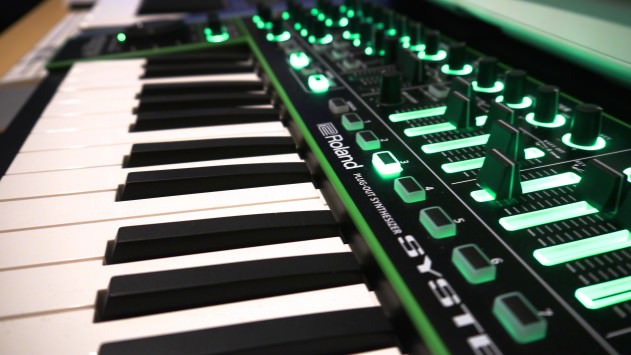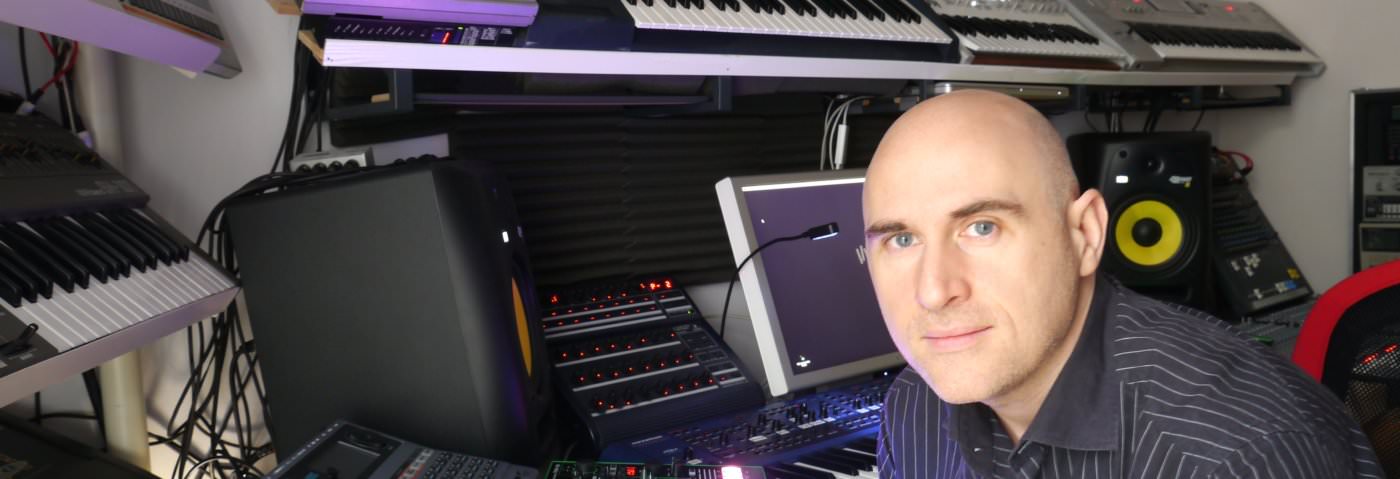
One brand that really jumps out in your studio is Roland, from the first bits that you bought, through all the drum machines, onto things like the JP-8000 and… is that the SH-201 you’ve got?
I only bought the 201 as a stage keyboard, because the internal sound engine’s mince. I’d never plug an audio cable into it, put it that way.
Yeah, but I only bought that because my 101 had broken down from playing it live so much and the layout of the controls on the 201 is exactly the same as the 101. I bought LuSH-101 and then I moved on to the TAL version eventually, with the 201 as a controller. That’s the only reason I bought the 201, as a stage keyboard, because the internal sound engine’s… mince, basically. I’d never plug an audio cable into it, put it that way.
So, 201 aside, what is it about Roland stuff that appeals to you?
I think I’ve always had a liking for the stuff that they make. It’s probably ease of use – they’re very hands-on machines. The early stuff was always amazing and the new stuff’s got the same potential, they just have to develop it a bit more. There was a big gap in the middle where they didn’t really make anything worth me buying. Probably from about ’98 to 2012 or 2013 they had a bad run, but I think they’re back on track now.
The JP-8000 is a less obvious choice than things like the 909 and 303.
It’s such an underrated synthesiser. People just think it’s a trance machine because all the trance guys used to use the first three presets on it, but it sounds really nice. I did a lot of my album on Delsin using the JP-8000 and everybody was always asking where I was getting those sounds from. It’s got a great engine inside it, you just have to tweak it a lot to get the good sounds out of it.
The thing is with Roland, you know they’ve got the brains to make what you want them to make, it’s just almost like waiting for them to deliver exactly what you need. A lot of the times when you buy a Roland synth you’re really happy with it but there’s just one thing – you’re like, I really wish it had that, you know?
When I was learning, the machines weren’t as complicated, but there were no tutorials, guides or YouTube videos
I suppose one of the attractions of buying vintage stuff is that you know exactly what you’re getting. If you buy an 808 or 909 you know it’s a staple.
Yeah, I think part of the problem with all manufacturers that make hardware now is that they’re making them so complicated. When I was buying vintage gear I didn’t have a clue what I was doing but I learned over a period of time because it wasn’t particularly difficult. But now if you look at the JD-XA or some of the new synths, for people who are learning it’d take you months to figure out what the hell you’re doing.
Are you glad you learned when things were a bit more restrictive but simpler, or do you think you’d have preferred to start making music today, with modern software and access to soft synths?
What I would say is that today there’s also a massive library of things like tutorials, guides and YouTube videos explaining how to make music. When I was learning, the machines weren’t as complicated, but there was nothing like that. Am I glad that I did it when I did it? Probably. Sometimes with machines I get a little bit impatient, so I’d probably be one of those people who doesn’t read the manual and dives in, but I think today there’s definitely enough resources out there for people to learn properly.
And do you think that has a positive impact on the music people are making?
Well, it’s very easy to just use the first preset in the synth and a compressor preset on every sound. If you don’t know what you’re doing it’s fairly obvious by the time you send your music away. But I think people who are really serious about their career will take the time to learn. You need to be patient with yourself and learn the basics first, and if you get the basics right the other stuff can come afterwards. I suppose in the end, if you don’t take the time to learn, you aren’t serious about it.
Find Vince Watson on Facebook, Twitter and SoundCloud.

04.42 PM
Nice read, top bloke.
06.52 PM
Great read and I also like that this is a studio tour with a ton of info on gear and the artist. Thanks.
10.51 PM
Super interesting.
03.05 AM
sounds like a great guys down to earth and a ton of knowledge
05.41 PM
Yes, synths were more affordable, but you needed to spend a lot for a 24 channel mixer, EQs and compressors etc.
Samplers were expensive as well.
A few hundred bucks for good cables, or noisy recordings. Speaking of recording: You needed a DAT or analog reel to reel or were limited the dirty sound of compact cassette. You wouldn’t have an overwhelming choice of affordable studio speakers…
10,000 bucks got you a small studio. But this was very limited compared to todays DAWs. Yet of course, compared to another 10, 20 years earlier, 10,000 was much more attainable. The Kraftwerk guys probably had to get their hands on much more money than just 10 grand to record.
04.06 PM
One of the best.